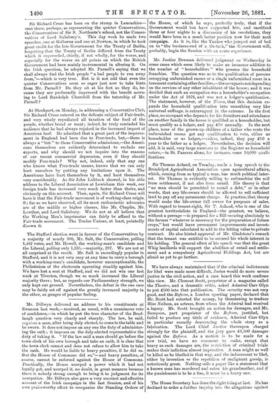We have always maintained that if the criminal indictment& for
libel were made more difficult, Juries would do more severe justice in the civil action, and a case heard this week confirm& this view. Mr. Clement Scott, proprietor of a magazine called the Theatre, and a dramatic critic, asked Admiral Carr Glyn to put £500 into that publication. The security was not very good, and the Referee, a London sporting paper, declared that Mr. Scott had extorted the money, by threatening to traduce Miss Neilson, an actress, from whom the Admiral had received a legacy. Mr. Scott brought an action for damages, and Mr. Sampson, part proprietor of the Referee, justified, but failed to produce any tittle of evidence, Admiral Carr Glyn in particular roundly denouncing the whole story as a fabrication. The Lord Chief Justice thereupon charged strongly for the plaintiff, and the jury gave £1,500 damages against the Referee. As a motion is to be made for a new trial, we have no comment to make, except that heavy as such damages are, the re3triction of criminal trials makes their infliction almost imperative. A man might as well be killed as be libelled in that way, and the inducement to libel, either by invention er the repetition of malignant gossip, is notoriously great. Nothing sells a paper like a statement that a known man has murdered and eaten his grandmother, and if the punishment is to be a fine, it must be a heavy one.


































 Previous page
Previous page